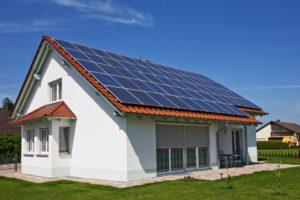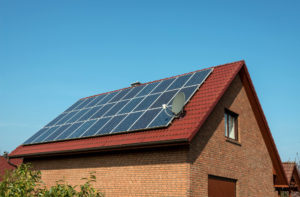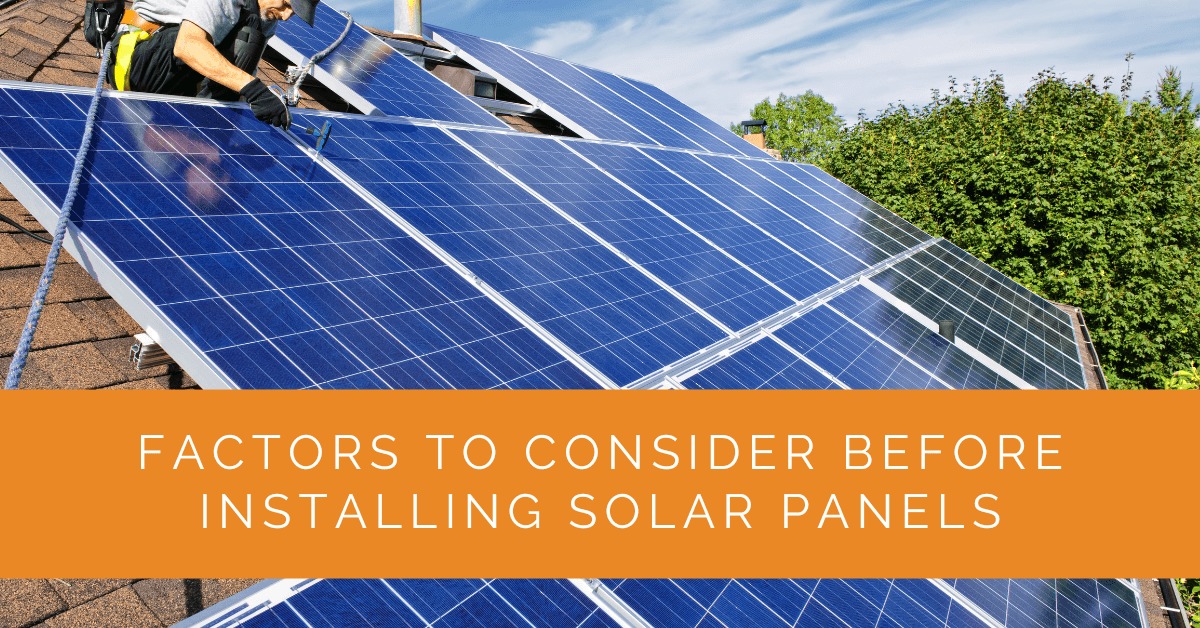Are you considering the installation of solar panels for your home or business? Before taking the leap, it’s crucial to weigh the various factors that can impact the effectiveness and success of your solar panel installation. By thoroughly considering these factors, you can make informed decisions and ensure that your solar panel system meets your energy needs and provides long-term benefits. This article will explore seven key factors before installing solar panels, guiding you toward a well-informed and successful solar energy transition. From assessing your energy requirements to evaluating roof suitability and understanding financial implications, each factor plays a significant role in optimizing the performance and efficiency of your solar panel system. So, let’s delve into the details and equip you with the knowledge needed to make the best choices for your solar power journey.
Contents
Factors to Consider Before Installing Solar Panels
1. Assess Your Energy Needs
Determining your energy needs is the first step in evaluating whether solar panels can meet your electricity requirements. Start by evaluating your current energy consumption and considering future needs. Analyze your historical electricity bills to understand your usage patterns, including peak consumption periods and average monthly or annual consumption. This analysis will help you gauge the size and capacity of the solar panel system you may need to install.
Consider your long-term goals, such as increasing energy efficiency or transitioning to a fully solar-powered home. If you plan to expand your household or add new appliances in the future, take these factors into account when assessing your energy needs.
2. Evaluate Roof Suitability
The suitability of your roof plays a vital role in the effectiveness of your solar panel installation. A sturdy, well-maintained roof is essential to support the weight of the panels and ensure their longevity. Before proceeding, have a professional assess your roof’s condition, age, and structural integrity.
Next, evaluate the roof’s sun exposure throughout the day. Solar panels require an ample amount of sunlight to generate electricity efficiently. If your roof is heavily shaded by trees, nearby buildings, or other obstructions, it may not be an ideal location for installation. However, partial shading can be addressed through advanced technologies like micro-inverters or power optimizers.
Furthermore, consider the orientation and angle of your roof. South-facing roofs with a tilt angle between 15 and 40 degrees typically receive optimal sun exposure, but east or west-facing roofs can also be viable options. Adjustments can be made to optimize the panel placement and maximize energy production.
3. Determine Available Space
The amount of available space on your roof will dictate the size and number of solar panels you can install. Assess the dimensions and layout of your rooftop to determine the feasibility of solar panel installation. Measure the available space, considering any existing fixtures like vents, chimneys, or skylights that may limit panel placement.
If your roof does not provide sufficient space for the desired solar panel system, you may explore alternative options such as ground-mounted systems or solar canopies. Ground-mounted systems are installed on the ground rather than on the roof, allowing for flexibility in positioning and potentially greater energy production. Solar canopies are structures that integrate solar panels and can be installed in open spaces like parking lots or backyards, providing shade while generating electricity.

4. Understand Financial Considerations
Solar panel installations come with upfront costs but can yield significant long-term savings. It’s essential to assess the financial aspects before committing to the installation. Consider the initial cost of purchasing and installing solar panels and evaluate the return on investment (ROI) over time.
Research available financial incentives, such as tax credits, rebates, or grants offered by local, state, or federal governments. These incentives can help offset the upfront costs and make installation more affordable. Additionally, check with your utility company if they offer any incentives for going solar, such as net metering programs or buyback agreements for excess electricity generated.
Explore different financing options, such as solar loans or leasing agreements. Solar loans allow homeowners to finance the installation cost and repay the loan gradually through affordable monthly installments. On the other hand, leasing agreements allow homeowners to rent the solar panel system and pay a fixed monthly fee. Both options have advantages and considerations, so it’s important to research and compare them to determine which option best aligns with your financial goals and circumstances.
In addition to financial considerations, consider the potential long-term savings from reduced electricity bills. Solar panels generate clean energy from sunlight, significantly reducing your reliance on the grid. By producing your electricity, you can reduce or even eliminate your monthly electricity expenses, depending on the size of the solar panel system and your energy consumption.
It’s advisable to shop around and obtain multiple quotes from reputable solar companies to ensure you’re getting competitive pricing and comprehensive service. Compare the offers carefully, considering the quality of the panels, warranties, installation services, and customer reviews. Remember that choosing a reputable and experienced solar company is crucial for a successful installation and long-term support.
5. Learn About Solar Panel Types and Technologies
Understanding the different types of solar panels and their technologies will help you decide when to select the right system for your home. The most common types of solar panels include monocrystalline, polycrystalline, and thin-film.
Monocrystalline panels are made from a single crystal structure, offering high efficiency and sleek aesthetics. Polycrystalline panels are made from multiple crystal structures and are generally more affordable but slightly less efficient. Thin-film panels are flexible and lightweight, suitable for specific applications but typically have lower efficiency.
Consider the efficiency, durability, and warranties offered by different panel manufacturers. Higher efficiency panels generate more electricity per square foot, maximizing energy production. Durability is important, as solar panels are exposed to various weather conditions over their lifespan. Look for panels with extended warranties to protect your investment and ensure long-term performance.
Additionally, research advanced technologies such as micro-inverters or power optimizers. Micro-inverters are installed behind each solar panel and optimize energy production by individually managing each panel’s output. Power optimizers perform a similar function by maximizing energy harvest, particularly in shading or panel mismatch situations.

6. Familiarize Yourself with Local Regulations and Permits
Before installing solar panels, it’s crucial to understand your area’s local regulations, zoning codes, and permit requirements. Different regions may have specific guidelines regarding the size, placement, and installation of solar panel systems. Familiarize yourself with these regulations to ensure compliance and avoid potential issues during and after installation.
Consult your local utility company to understand their interconnection rules and net metering policies. Net metering allows you to sell excess electricity your solar panels generate back to the grid, potentially offsetting your energy costs further. Be aware of any paperwork or agreements required for participation in net metering programs.
If you live in a homeowners’ association (HOA) or a community with specific guidelines, check their policies regarding solar panel installations. Some HOAs have specific architectural or aesthetic requirements that might impact the placement or appearance of solar panels. Ensure you comply with these guidelines to avoid any conflicts or limitations.
7. Consider Maintenance and Upkeep
Proper maintenance and upkeep are essential to ensure your solar panel system’s longevity and optimal performance. Although solar panels are known for their durability and low maintenance requirements, regular upkeep is necessary to maximize their efficiency and lifespan.
Learn about the maintenance procedures for solar panels, including cleaning, inspection, and potential repairs. Keep the panels free from debris, dust, or any shading objects that can obstruct sunlight. Regularly inspect the panels for any signs of damage, such as cracks or loose connections, and promptly address them to prevent further issues.
Research the warranties offered by the panel manufacturer and the installation company. A comprehensive warranty should cover the panels, inverters, and other system components. Understand the warranty terms, including coverage period, performance guarantees, and any exclusions or limitations. This will give you peace of mind and assurance that you’re protected against potential defects or performance issues.
Consider service contracts or maintenance agreements offered by solar installation companies. These agreements can provide regular maintenance and inspection services, ensuring your solar panel system operates at its best. Professional maintenance can also help detect and address any issues early on, preventing costly repairs or system inefficiencies.
It’s important to note that while solar panels are designed to withstand various weather conditions, including rain, snow, and hail, extreme weather events or severe damage may require repairs or replacements. Understanding the warranty coverage and planning for such situations will help you navigate any unexpected circumstances effectively.
Case Study: Optimizing Solar Panel Installation for a Residential Home
Background
At Solar Panels Network USA, we were approached by a homeowner seeking to transition to solar energy. The homeowner aimed to reduce their electricity bills and contribute to environmental sustainability. This case study explores our comprehensive approach to evaluating and optimizing the installation of solar panels for their home.
Project Overview
The primary goal was to design and install a solar panel system that met the homeowner’s energy needs while maximizing efficiency and cost savings. This involved assessing various factors such as energy consumption, roof suitability, available space, financial considerations, and compliance with local regulations.
Implementation
Assessing Energy Needs
We began by analyzing the homeowner’s electricity bills to understand their usage patterns. This historical data provided insights into their peak consumption periods and average monthly usage. We also discussed their long-term goals, including potential future expansions or additions of energy-intensive appliances.
Evaluating Roof Suitability
Next, our team conducted a thorough inspection of the roof. We assessed its condition, age, and structural integrity. Using advanced tools, we evaluated the roof’s sun exposure, considering any potential shading from nearby trees or structures. We determined that the south-facing portion of the roof, with a tilt angle of 30 degrees, was ideal for maximum solar energy capture.
Determining Available Space
We measured the roof’s dimensions and identified optimal locations for panel placement, considering existing fixtures like chimneys and vents. Although the roof had sufficient space for the desired system size, we also discussed ground-mounted systems as a viable alternative if future expansions were considered.
Understanding Financial Considerations
We provided the homeowner with a detailed financial analysis, including the initial installation cost, potential savings on electricity bills, and available incentives. We explored financing options, including solar loans and leasing agreements, to make the installation more affordable. By leveraging federal tax credits and state rebates, we significantly reduced the upfront cost.
Selecting Solar Panel Types and Technologies
After discussing the homeowner’s preferences and budget, we recommended monocrystalline solar panels due to their high efficiency and sleek appearance. We also integrated micro-inverters to optimize energy production, especially given the slight shading observed during certain times of the day.
Navigating Local Regulations and Permits
We handled all necessary paperwork, including permit applications and compliance with local zoning regulations. Our team coordinated with the local utility company to ensure smooth interconnection and participation in net metering programs.
Ensuring Maintenance and Upkeep
To guarantee the longevity and efficiency of the solar panel system, we provided the homeowner with a maintenance plan. This included regular inspections, cleaning procedures, and monitoring the system’s performance. We emphasized the importance of prompt attention to any signs of damage or reduced efficiency.
Results
The solar panel system was successfully installed, providing the homeowner with a reliable and sustainable energy source. The system’s performance exceeded expectations, significantly reducing electricity bills and contributing to environmental conservation. The homeowner expressed satisfaction with the seamless installation process and the comprehensive support provided by our team.
Summary
This case study highlights the importance of a thorough and holistic approach to solar panel installation. By considering factors such as energy needs, roof suitability, financial implications, and maintenance requirements, Solar Panels Network USA successfully optimized the solar installation for the homeowner. Our expertise and commitment to quality ensured a smooth transition to solar energy, delivering long-term benefits and satisfaction.
Expert Insights From Our Solar Panel Installers About Installing Solar Panels
Assessing your energy needs is the foundational step. Without a clear understanding of your consumption patterns, it’s challenging to design a system that truly meets your requirements. Analyzing your electricity bills and considering future expansions ensures you’re making a well-informed decision.
Senior Solar Energy Consultant
Roof suitability is a critical factor. A thorough roof inspection by a professional can identify any structural issues or shading problems that could impact the efficiency of your solar panels. Addressing these factors upfront can prevent future complications.
Lead Solar Installer
Understanding financial implications, including potential savings and available incentives, is essential for a successful solar investment. It’s not just about the upfront cost but the long-term benefits and return on investment.
Solar Financial Analyst
Experience Solar Excellence with Us!
Trust in Solar Panels Network USA, where our seasoned experts deliver top-quality solar solutions for homes and businesses nationwide. With a legacy of countless successful installations and a commitment to sustainable energy, we’re your reliable partner in the solar journey. Ready for a brighter, eco-friendly future? Call us now at (855) 427-0058 and harness the power of the sun!
Conclusion
Installing solar panels is a significant investment that can offer numerous benefits, including reduced energy costs, environmental sustainability, and increased energy independence. However, to ensure a successful solar panel installation, it’s crucial to consider various factors before deciding.
By assessing your energy needs, evaluating roof suitability, understanding the financial implications, exploring different panel types and technologies, familiarizing yourself with local regulations, and considering maintenance requirements, you can make an informed choice that aligns with your goals and maximizes the benefits of solar power.
Remember to research and gather multiple quotes from reputable solar companies, compare warranties and service offerings, and be aware of any financial incentives, such as tax credits or rebates that may make the installation more affordable. Additionally, understanding local regulations, permit requirements, and maintenance procedures will help you navigate the process smoothly.
Harnessing solar energy by installing solar panels is a forward-thinking and environmentally responsible choice. Take the time to educate yourself, consult with professionals, and make decisions that align with your needs and circumstances. By doing so, you can embark on a successful solar installation journey and enjoy the long-term advantages of clean and sustainable energy for your home.
About the Author
Solar Panels Network USA stands at the forefront of solar energy solutions, driven by a team of seasoned solar engineers and energy consultants. With over decades of experience in delivering high-quality solar installations and maintenance, we are committed to promoting sustainable energy through customer-centric, tailored solutions. Our articles reflect this commitment, crafted collaboratively by experts to provide accurate, up-to-date insights into solar technology, ensuring our readers are well-informed and empowered in their solar energy decisions.

